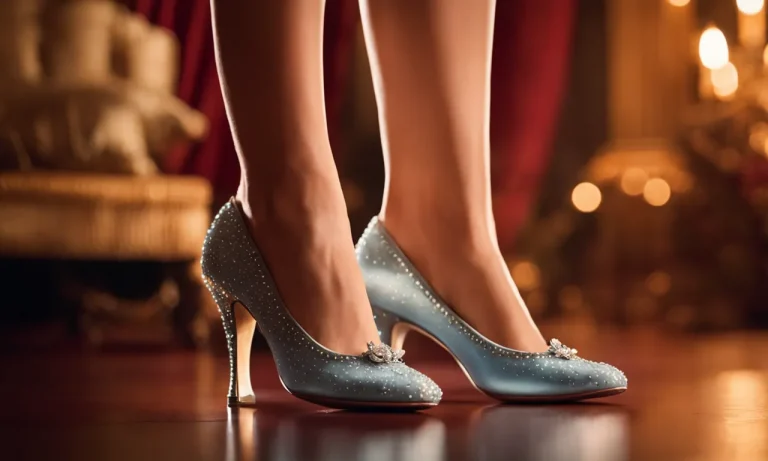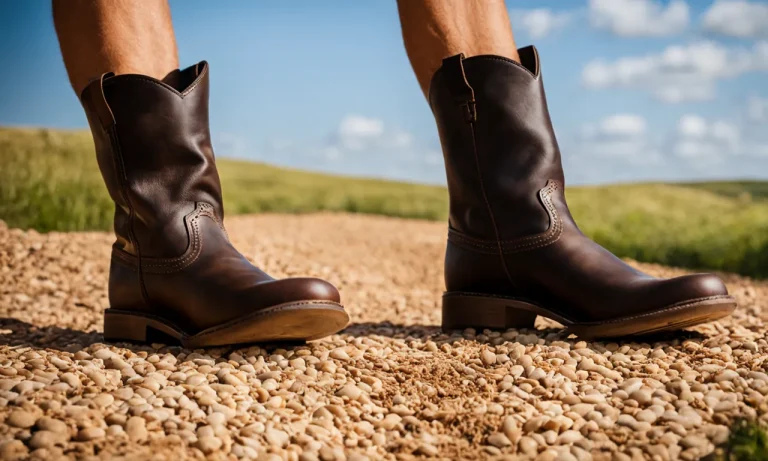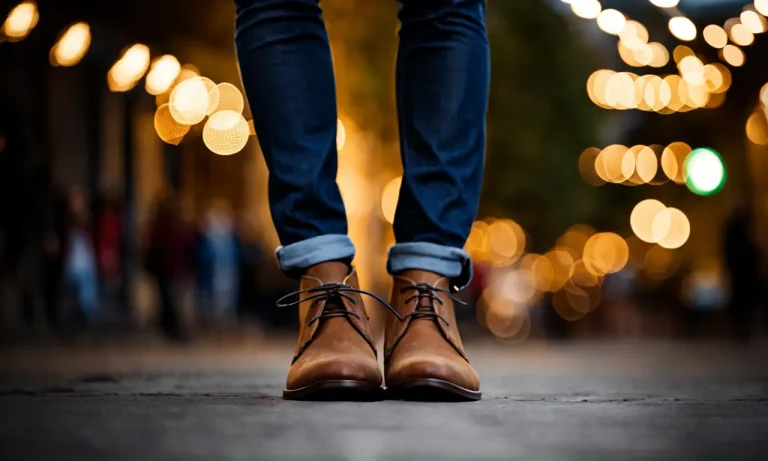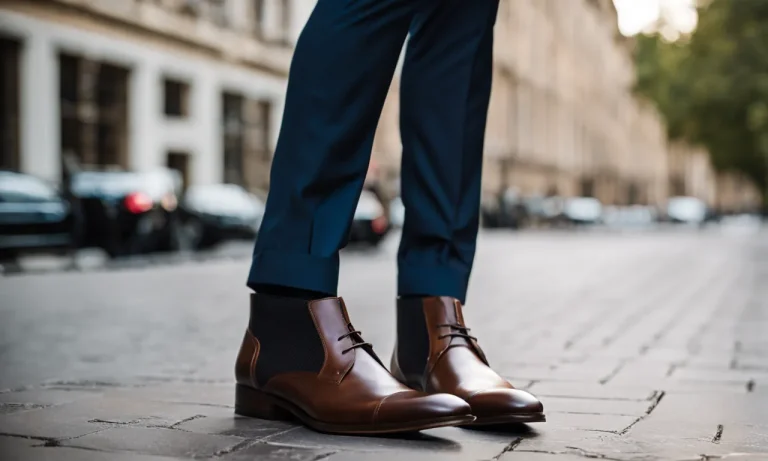Sewing machines designed for shoe repair allow cobblers and DIYers to stitch, reinforce, and reconstruct all types of footwear with precision and ease. If you are looking to start or improve a shoe repair business or simply want to salvage your favorite pair of boots, having the right shoe repair sewing machine is crucial.
The best shoe repair sewing machines are powerful, heavy-duty, and designed to handle thick shoe leather and tough materials. They often come with specialized presser feet and attachments for tasks like attaching soles and heels.
For a quick answer, the Juki DNU-1541S is an industrial-grade single needle sewing machine that excels at shoe repair.
In this comprehensive guide, we will cover everything you need to know about choosing the ideal shoe repair sewing machine. You’ll learn about critical factors like stitch type, needle force, motor power, and specialized features for cobblers.
We’ve also put together shoe repair sewing machine reviews and clear comparisons to help you select the right model for your needs and budget, whether you require an industrial machine or a more affordable home model.
Key Considerations When Choosing a Shoe Repair Sewing Machine
When it comes to shoe repair, having a reliable sewing machine is essential. Whether you are a professional cobbler or someone who wants to repair their own shoes at home, choosing the right sewing machine can make all the difference.
Here are some key considerations to keep in mind when selecting a shoe repair sewing machine:
Single vs. Double Needle
One important decision to make is whether to opt for a single or double needle sewing machine. A single needle machine is suitable for most basic shoe repairs and can handle a wide range of materials. On the other hand, a double needle machine offers added versatility and allows for more intricate stitching patterns.
Consider the types of repairs you will be doing and choose accordingly.
Motor Type and Power Output
The motor type and power output of a sewing machine can greatly affect its performance. Look for a machine with a powerful and durable motor that can handle heavy-duty materials such as leather or rubber. This will ensure smooth and efficient stitching, even on tougher shoe repair projects.
Stitch Length and Teflon-Coated Surfaces
The stitch length options on a sewing machine are important to consider. Different shoe repairs may require different stitch lengths, so having a machine with adjustable stitch length settings can be beneficial.
Additionally, look for a machine with teflon-coated surfaces, as this can help reduce friction and make sewing smoother and more precise.
Throat Space and Presser Foot Pressure
Throat space refers to the distance between the needle and the body of the sewing machine. For shoe repairs, a machine with ample throat space is ideal as it allows for easier maneuvering of the shoe and fabric. Additionally, consider the presser foot pressure.
Adjustable presser foot pressure is important for handling different types of materials, ensuring even stitching and preventing damage to delicate fabrics.
Warranty and Customer Support
Lastly, don’t forget to consider the warranty and customer support offered by the sewing machine manufacturer. A reliable warranty can provide peace of mind and protect your investment. Look for a brand that offers good customer support, so you can easily get assistance or replacement parts if needed.
By considering these key factors when choosing a shoe repair sewing machine, you can ensure that you are making a well-informed decision. Remember to assess your specific needs and preferences, and don’t hesitate to seek advice from professionals or read reviews from reputable sources like www.shoerepairmachines.com to help guide your decision-making process.
Happy sewing!
Reviews of the Top Industrial Shoe Repair Sewing Machines
Juki DNU-1541S
The Juki DNU-1541S is widely regarded as one of the best shoe repair sewing machines on the market. It is a heavy-duty machine that can handle a wide range of materials, from leather to canvas. The powerful motor and high sewing speed make it ideal for professional cobblers who need to complete repairs quickly and efficiently.
One of the standout features of the Juki DNU-1541S is its ability to sew through multiple layers of fabric with ease. This makes it perfect for stitching together the soles and uppers of shoes, ensuring a strong and durable bond.
The machine also offers a variety of stitch options, allowing cobblers to create different patterns and designs to suit their customers’ preferences.
Customers who have used the Juki DNU-1541S rave about its reliability and durability. Many have reported using the machine for years without any issues, making it a worthwhile investment for both professional cobblers and home users.
Consew 206RB-5
The Consew 206RB-5 is another popular choice among cobblers and shoe repair enthusiasts. This machine is known for its exceptional stitch quality and precision. It features a walking foot mechanism that ensures even feeding of the fabric, resulting in consistent and professional-looking stitches.
The Consew 206RB-5 is built to handle heavy-duty projects, making it ideal for shoe repairs. Its powerful motor can sew through thick leather and other tough materials without skipping stitches or causing any damage.
The machine also offers adjustable stitch length and thread tension, giving users full control over their sewing projects.
Customers who have used the Consew 206RB-5 praise its durability and ease of use. Many have found it to be a reliable workhorse that consistently delivers high-quality results. With proper maintenance and care, this machine can last for many years, making it a great investment for anyone in the shoe repair business.
Adler 205-370-7
The Adler 205-370-7 is a top-of-the-line shoe repair sewing machine that offers exceptional performance and versatility. It is equipped with a powerful motor and a large sewing area, allowing users to work on a wide range of shoe sizes and styles.
The machine’s advanced features make it a favorite among professional cobblers.
One of the key features of the Adler 205-370-7 is its automatic thread trimmer, which saves time and effort by cutting the thread automatically at the end of each seam. This feature is especially useful for cobblers who handle a high volume of shoe repairs on a daily basis.
In addition to its impressive speed and efficiency, the Adler 205-370-7 also offers a variety of stitch options, including decorative stitches for added customization. It is a reliable and durable machine that can withstand long hours of use without compromising on stitch quality.
Sailrite Ultrafeed LSZ-1
The Sailrite Ultrafeed LSZ-1 is a versatile shoe repair sewing machine that is designed for both professional cobblers and home users. It is known for its portability and ease of use, making it a popular choice among those who need to take their sewing projects on the go.
One of the standout features of the Sailrite Ultrafeed LSZ-1 is its ability to sew through thick and heavy materials, such as leather and rubber. It is equipped with a powerful motor and a walking foot mechanism that ensures smooth and consistent feeding of the fabric.
The Sailrite Ultrafeed LSZ-1 also offers adjustable stitch length and width, allowing users to customize their stitches according to their specific needs. It comes with a range of accessories and attachments, making it a versatile machine for a variety of shoe repair tasks.
Customers who have used the Sailrite Ultrafeed LSZ-1 appreciate its durability and reliability. Many have found it to be a great investment for both professional and personal use, as it consistently delivers high-quality results.
Best Home Use Shoe Repair Sewing Machines
Janome HD3000
The Janome HD3000 is a top choice for home use shoe repair sewing machines. It is known for its durability and ability to handle heavy-duty materials. With a powerful motor and a sturdy build, this machine can easily sew through leather, canvas, and other tough materials commonly used in shoe repair.
It also offers a variety of stitches and adjustable stitch length and width, allowing you to customize your repairs. The Janome HD3000 is a reliable and efficient option for both beginners and experienced cobblers.
SINGER 4423
The SINGER 4423 is another excellent choice for home use shoe repair sewing machines. It is praised for its high sewing speed, capable of stitching up to 1,100 stitches per minute. This machine also features a heavy-duty metal frame and a powerful motor, making it suitable for repairing shoes made of different materials.
The SINGER 4423 comes with 23 built-in stitches, including basic, decorative, and stretch stitches, providing versatility in your shoe repair projects. It is a durable and reliable option that can handle various repair tasks.
Brother ST371HD
The Brother ST371HD is a versatile shoe repair sewing machine that offers both strength and convenience. It is equipped with a strong metal frame and a powerful motor, allowing it to handle heavy-duty materials with ease.
This machine offers 37 built-in stitches, including decorative and stretch stitches, giving you more options for repairing and embellishing shoes. The Brother ST371HD also features a wide table for larger projects and an automatic needle threader for added convenience.
It is a user-friendly machine suitable for both beginners and advanced users.
Merrow MG-3100
The Merrow MG-3100 is a specialized shoe repair sewing machine designed specifically for cobblers. It is known for its precision and efficiency in repairing shoes. This machine is equipped with a unique stitch type, known as the Merrow stitch, which creates a strong and durable seam.
Additionally, the Merrow MG-3100 has a high sewing speed and can handle various materials, including leather, suede, and rubber. This machine is a favorite among professional cobblers and is an excellent investment for those who are serious about shoe repair.
Tips, Tricks and Accessories for Shoe Repair Sewing
Using the Right Needles and Thread
When it comes to shoe repair sewing, using the right needles and thread is essential for achieving professional results. Cobblers and home users alike should invest in high-quality needles specifically designed for sewing shoes.
These needles are typically thicker and stronger than regular sewing needles, allowing them to withstand the tough material of shoes. It is also important to choose a thread that is durable and resistant to wear and tear. Nylon or polyester thread is often recommended for shoe repair projects.
Specialty Presser Feet for Shoe Work
Another useful accessory for shoe repair sewing machines is specialty presser feet. These presser feet are designed to handle the unique requirements of shoe repair, such as sewing through thick leather or multiple layers of fabric.
The roller foot is a popular choice among cobblers as it helps to feed the material smoothly and evenly through the machine. The Teflon foot is also widely used as it prevents the material from sticking to the foot, allowing for easy and precise stitching.
Getting Clean and Precise Stitching
To achieve clean and precise stitching, cobblers and home users should pay attention to the tension settings on their sewing machines. Proper tension ensures that the stitches are evenly spaced and secure. It is also important to adjust the stitch length according to the type of repair being done.
For example, shorter stitches may be needed for delicate repairs, while longer stitches can provide added strength for more heavy-duty repairs. Taking the time to practice and experiment with different settings can greatly improve the quality of the stitching.
Caring for the Machine
Proper maintenance and care of the sewing machine are crucial for its longevity and optimal performance. Regular cleaning of the machine, especially the bobbin area, helps to prevent build-up of dust and lint that can affect the sewing quality.
Lubricating the moving parts with sewing machine oil ensures smooth operation and reduces friction. Cobblers and home users should also check for any loose screws or parts and tighten them as necessary.
Following the manufacturer’s instructions for maintenance and servicing will help keep the machine in great working condition for years to come.
Frequently Asked Questions about Shoe Repair Sewing Machines
Q: Should I buy a single or double needle machine?
When it comes to choosing between a single or double needle machine for shoe repair, it really depends on your specific needs and preferences. A single needle machine is suitable for most basic shoe repairs and is more affordable. It can handle tasks like stitching soles and repairing small tears.
On the other hand, a double needle machine allows for more intricate stitching patterns and can handle thicker materials. If you plan on doing more advanced shoe repairs or working with thicker leather, a double needle machine might be a better option.
Q: How powerful of a motor do I need?
The power of the motor you need for a shoe repair sewing machine largely depends on the volume of work you expect to handle. If you’re a professional cobbler or plan on using the machine for heavy-duty repairs, a more powerful motor will be necessary to handle the constant use and stitching through thick materials.
However, for occasional or home use, a less powerful motor may be sufficient. It’s important to find a balance between power and cost that suits your specific needs.
Q: Are all sewing machines suitable for leather?
No, not all sewing machines are suitable for sewing leather. Leather is a tough and thick material that requires a sewing machine with specific features to handle it effectively. Look for a machine with a heavy-duty build, a strong needle, and a powerful motor.
Additionally, some sewing machines have special features like a walking foot or an adjustable presser foot pressure, which can help in sewing leather more smoothly. It’s important to choose a sewing machine specifically designed for leather and shoe repair to ensure optimal results.
Q: What maintenance do shoe repair machines need?
Like any other mechanical device, shoe repair sewing machines require regular maintenance to ensure their longevity and optimal performance. Here are some maintenance tasks to keep in mind:
- Regularly clean and oil the machine to prevent dust and debris from affecting its operation.
- Replace needles regularly to prevent damage to the machine and ensure clean stitching.
- Check and adjust the tension of the machine to avoid loose or tight stitches.
- Keep the machine covered when not in use to protect it from dust and other environmental factors.
- Consult the user manual or seek professional assistance for any specific maintenance requirements of your shoe repair machine model.
By following these maintenance tips, you can ensure that your shoe repair sewing machine stays in great shape and continues to provide reliable service for years to come.
Conclusion
With their high piercing power, specialty presser feet, and durable construction, shoe repair sewing machines allow you to stitch, patch, and reconstruct footwear with ease. Picking the right machine for your needs and budget ultimately comes down to factors like motor strength, needle type, throat space, and included accessories.
For professional cobblers, powerful walk-along industrials like the Juki DNU-1541S represent the gold standard for shoe repair work. Home sewers can achieve quality results with standard machines like the Janome HD3000, paired with the right needles, presser feet, and techniques.
We hope our sewing machine reviews and buying considerations help you select the ideal model for resoling boots, mending uppers, and other shoe repair tasks. With the proper machine, you’ll be able to give your customers’ beloved footwear a second life.






